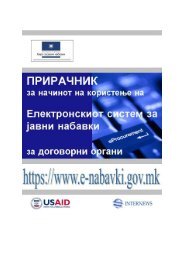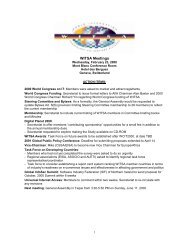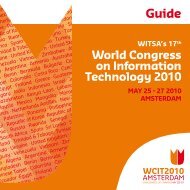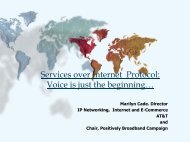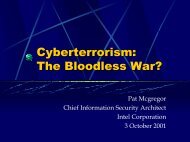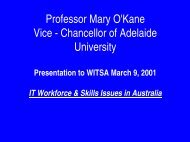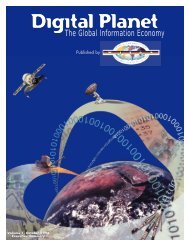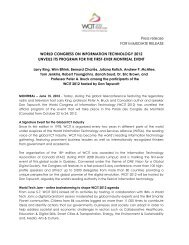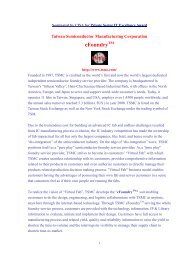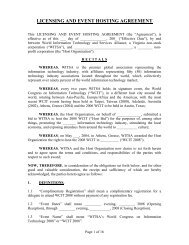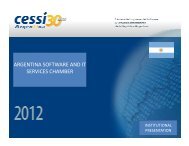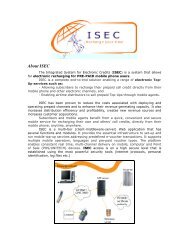STATEMENT ON INFORMATION SECURITY June 2005 ... - WITSA
STATEMENT ON INFORMATION SECURITY June 2005 ... - WITSA
STATEMENT ON INFORMATION SECURITY June 2005 ... - WITSA
You also want an ePaper? Increase the reach of your titles
YUMPU automatically turns print PDFs into web optimized ePapers that Google loves.
<strong>STATEMENT</strong> <strong>ON</strong> INFORMATI<strong>ON</strong> <strong>SECURITY</strong><strong>June</strong> <strong>2005</strong>IntroductionInformation technology has changed the way we do business, and is present in every aspect ofthe economy -- from banking and finance, transportation and utilities, to food production anddistribution, government, and nearly everything else of importance to economic and physicalwell being. In an automation-reliant society, there is no real physical or economic securitywithout information security. This reality is becoming ever more stark every day, as the globalinformation infrastructure – and the physical infrastructures it supports, comes under attack fromhackers and cyber criminals.Information technology is ubiquitous – that is, computers, networks and software operatingeverywhere at once – and thus so are vulnerabilities. One challenge is the prevalence ofcriminal cyber attacks: computer viruses and other malicious code damage or destroy files anddata; network intruders steal secrets or other sensitive information; distributed denial of service(DDOS) attacks restrict or eliminate access to the Internet. And, as more sensitive andclassified information is made available to more and more users, the insider threat will increaseexponentially, making it possible for trusted insiders to engage in criminal activity, includingterrorism and economic espionage.But information technology is not just vulnerabilities and targets, but also offers potent tools forprotecting against and responding to attacks, analyzing them and mitigating their damage.Private industry owns and operates the vast majority of the world’s information infrastructure.Protecting global cyber assets is the job of the private sector and the public sector working inpartnership as appropriate to secure cyber assets.In both the public and private sectors, information security challenges must be met with acombination of factors, namely: People, Processes and Technology. Individuals must bevigilant in maintaining the security processes laid out by organizations; organizations mustimplement and enforce security processes and procedures; and business and government mustuse multiple layers of security technology to deter threats. All three are necessary to minimizerisk.Technology is ever-changing; business models and processes – and the information systemsthat support them -- are widely varied; and human interaction with those technologies andprocesses that provide security is complex and subject to error. But information security isindeed everyone’s business, and <strong>WITSA</strong> encourages a strong public private partnership tocatalyze those synergies. Solutions developed collaboratively by industry and public policymakers can help minimize the threat of attack and ensure that our systems remain protectedfrom a new brand of criminal – the cyber criminal.1
Without concerted attention to cyber security – in the form of investment, awareness andtraining, research, information sharing, and other activities – the world’s information will continueto come under ever more sophisticated attack, with costly and potentially catastrophic impact.The World Information Technology and Services Alliance (<strong>WITSA</strong>)The World Information Technology and Services Alliance (<strong>WITSA</strong>) is a global alliance ofnational and regional information technology (IT) industry associations from 67 economiesaround the world. <strong>WITSA</strong> members represent over 90 percent of the world IT market. As theglobal voice of the IT industry, <strong>WITSA</strong> is dedicated to:• advocating policies that advance the industry’s growth and development;• facilitating international trade and investment in IT products and services;• strengthening <strong>WITSA</strong>’s national industry associations through the sharing of knowledge,experience, and critical information;• providing members with a vast network of contacts in nearly every geographic region of theworld; and• hosting the World Congress on IT, the premier industry sponsored global IT event.Founded in 1978 and originally known as the World Computing Services Industry Association,<strong>WITSA</strong> has increasingly assumed an active advocacy role in international public policy issuesaffecting the creation of a robust global information infrastructure, including: increasingcompetition through open markets and regulatory reform; protecting intellectual property;encouraging cross-industry and government cooperation to enhance information security;bridging the education and skills gap; reducing tariff and non-tariff trade barriers to ITgoods and services; and safeguarding the viability and continued growth of the Internet andelectronic commerce.<strong>WITSA</strong> has an impact on the global IT environment. It strengthens the industry at large bypromoting a level playing field and by voicing the concerns of the international IT community inmultilateral organizations, including the World Trade Organization (WTO), the Organization forEconomic Cooperation and Development (OECD), the G-8 and other international fora wherepolicies affecting industry interests are developed. More information on <strong>WITSA</strong> can be foundonline at http://www.witsa.org.International EffortsDue to the global nature of the Internet and communications, failure to protect criticalinformation systems and infrastructure at the national, local or even individual level can haveglobal implications. In a networked world, information security is as strong as its weakest link.Countering hacking, allowing strong encryption software, providing mechanisms to deal withviruses, and protecting the privacy of Internet users are all priorities that need to be addressedglobally. It is of vital importance that governments and international organizations concernedwork closely together and cooperate fully with the private sector.<strong>WITSA</strong> has been active in promoting public-private sector cooperation in order to raiseawareness and suggest policies and practices that provide greater security for informationsystems, including convening a Global Information Security Summit in 2000, collaborating on aGlobal Security Project, issuing statements on cyber crime, and developing a framework forinformation security. (All materials can be found on the <strong>WITSA</strong> website – www.witsa.org.)2
Joint Principles• The Internet and electronic commerce are inherently global in nature; therefore,information security will require collaboration among international bodies and arecognition by government of the challenges faced by industry in these areas.• Industry and government share an interest in the proliferation of a free and openInternet, electronic commerce, other value-added networks, and an efficient, effectiveinformation infrastructure generally.• Positive interaction between government and industry is essential. Among issues thatwill require on-going communication and assessment is the need to balance anindividual's right to privacy with national security concerns.• Emergency response organizations must gain sufficient situational awareness anddisaster recovery expertise to minimize the effect of catastrophic events on theinformation infrastructure.Government Principles• The assurance of national information infrastructure must be based on the minimumamount of government (national, state/province, and local) regulation as is feasible.• The cost of protecting national information infrastructure must be kept at a levelcommensurate with the threat and the consequences of attack.• Governments must work together internationally to coordinate their own Informationsecurity and critical infrastructure assurance programs and activities.• Where corrective information security action is required to protect the public good,government must identify such instances and create appropriate research, developmentand funding mechanisms• In creating and maintaining the information infrastructure and its associated tools andtechnologies, industry must be provided safe harbor assurances when it has madereasonable efforts and its works viewed as incidental to losses caused by criminal ormalicious misbehavior or natural disasters.• Distinctions must be made among cyber-mischief, cyber-crime and cyber-war to clarifyjurisdictional issues and determine appropriate responses. The adequacy of current lawsto prevent these threats must be reviewed.• Existing laws must be adapted as necessary to allow appropriate levels of informationsharing among companies, and between the private sector and government.• Current policy in areas such as the tax credits for research, software encryption,workforce training and long-term government research and development funding mustbe reviewed in light of common information security goals and objectives.4
• Law enforcement agencies on a global basis must gain sufficient cyber-crime expertiseto combat specific threats and to investigate specific criminal acts. Also, legal statutesmust be updated since in some countries cyber crime is a novelty unrecognized bycriminal statutes while the possibility of such crimes being committed is real.Industry Principles• Industry owns and operates most of the world’s information infrastructures, so shouldhave primary responsibility for information security requirements, design andimplementation.• Industry will be guided by business continuity considerations to protect itself againstphysical and cyber-attack as the threats to the information infrastructure grow.• Industry should cooperate both internally and with government in reporting andexchanging non-proprietary information concerning threats, attacks and protectivemeasures. Coordination among principals must facilitate creation of early warningsystems.• Make security a top priority, and put security at the heart of the design process, andwhere possible, use government, industry and international standards.• Work with home users, small businesses and large enterprises (including governmentagencies and educational institutions) in a continual process of improving the security,maintenance and reliability of products that maximize users’ productivity.• Continue to improve the engineering, development, testing and training processes andmethods that reduce defects in systems specification, design, implementation andremediation (patching). Partner with government and academia to develop automatedtools for evaluating software quality and security.• Identify, adopt, train and deploy information security best practices with clearly assignedcyber security roles and responsibilities for all employees and organizational leadership.5
The World Information Technology and Services Alliance (<strong>WITSA</strong>)ArgentinaArmeniaAustraliaBangladeshBeninBrazilBulgariaCanadaChinese TaipeiColombiaCosta RicaCzech RepublicEcuadorEgyptFinlandFranceCámara de Empresas de Software y Servicios Informáticos (CESSI)URL: http://www.cessi.org.ar / E-mail: camara@cessi.org.arArmenian Union of Information Technology Enterprises (UITE)URL: http://www.uite.org/ E-mail: uite@arminco.comAustralian Information Industry Association (AIIA)URL: http://www.aiia.com.au/ E-mail: aiia@aiia.com.auBangladesh Computer Samity (BCS)URL: http://www.bcs-bd.org/ E-mail: samity@dhaka.agni.comAP.TIC Benin – The Professionals of Information and Communiction TechnologyAssociation URL: http://www.apticbenin.org E-mail: contact@apticbenin.orgSociedade de Usuários de Informática e Telecomunicações - Sao Paulo (Sucesu-SP)URL: http://www.sucesusp.org.br E-mail: sucesusp@sucesusp.org.brBulgarian Association of Information Technologies (BAIT)URL: http://www.bait.bg/ E-mail: bait@spnet.netInformation Technology Association of Canada (ITAC)URL: http://www.itac.ca/ E-mail: info@itac.caInformation Service Industry Association of Chinese Taipei (CISA)URL: http://www.cisanet.org.tw; E-mail: cisa@mail.cisanet.org.twColombian Software Industry Federation (FEDESOFT) URL: www.fedesoft.org E-mail:proyectos@cati.org.coCosta Rican Chamber of Information and Communication Technologies (Camtic)URL: http://www.camtic.org/ E-mail: fcartin@camtic.orgAssociation for Consulting to Business (Asociace Pro Poradenství v Podnikání - APP)URL: http://www.asocpor.cz/ E-mail asocpor@asocpor.czAssociation Ecuatoriana de Tecnologia de Informacion y Servicios (AETIS)URL: http://www.aetis.org.ec E-mail: aetis@usa.netEgyptian Information Technology, Electronics and Software Alliance (EITESAL)URL: http://www.eitesal.org E-mail: moh.fouad@eitesal.comFederation of the Finnish Information Industries (TIETOALAT)URL: http://www.finnishinformationindustries.net E-mail: info@tietoalojenliitto.fiSyntec InformatiqueURL: http://www.syntec-informatique.fr/ E–mail: jpeybert@syntec-informatique.fr6
GreeceHong KongHungaryIndiaIndonesiaIsraelItalyJapanJordanKenyaLebanonLithuaniaMalaysiaMexicoMongoliaMoroccoFederation of Hellenic Information Technology and Communications Enterprises(SEPE) URL: http://www.sepe.gr / E-mail: sepe@compulink.grHong Kong Information Technology Federation (HKITF)URL: http://www.hkitf.org.hk/ E-mail: mok@hknet.comHungarian Association of IT Companies (IVSZ)URL: http://www.ivsz.net/ E-mail: szekfu@ivsz.huNational Association of Software and Service Companies (NASSCOM)URL: http://www.nasscom.org/ E-mail: nasscom@nasscom.orgASPILUKI - Indonesian Telematic Software AssociationURL: http://www.aspiluki.or.id/ E-mail: g_rianto@link.net.idIsraeli Association of Software Houses (IASH)URL: http://www.iash.org.il/ E-mail: software@industry.org.ilAssociazione Nazionale Aziende Servizi Informatica e TelematicaURL: http://www.anasin.it/ E-mail: Anasin@anasin.itJapan Information Technology Services Industry Association (JISA)URL: http://www.jisa.or.jp/ E-mail: info@jisa.or.jpInformation Technology Association - Jordan (int@j)URL: http://www.intaj.net/ E-mail: info@intaj.netComputer Society of Kenya (CSK)URL: http://www.csk-online.org; E-mail: charlesnduati2002@yahoo.co.ukProfessional Computer Association of Lebanon (PCA)URL: http://www.pca.org.lb/ E-mail: Info@pca.org.lbAssociation of the information technology, telecommunications and office equipmentcompanies of Lithuania (INFOBALT) http://www.infobalt.lt/ E-mail: office@infobalt.ltAssociation of the Computer And Multimedia Industry Malaysia (PIKOM)URL: http://www.pikom.org.my E-mail: info@pikom.org.myAsociación Mexicana de la Industria de Tecnologías de Información (AMITI)URL: http://www.amiti.org.mx/ E-mail: amiti@amiti.org.mxMongolian National Information Technology Association; badarch@magicnet.mnl'Association des Professionnels des Technologies de l'Information (APEBI);http://www.apebi.org.ma/ E-mail: apebi@apebi.org.maNepal Computer Association of Nepal (CAN) / http://www.can.org.np/ /info@can.mos.com.npNetherlandsNetherlands AntillesNew ZealandNorthern IrelandNorwayFederation of Dutch Branch Associations in Information Technology (FederatieNederlandse IT - FENIT) URL: http://www.fenit.nl/ E-mail: bureau@fenit.nlCuracao Information & Communication Association (CICA) URL: http://www.cica.an;E-mail: info@cica.anInformation Technology Association of New Zealand (ITANZ)URL: http://www.itanz.org.nz/ E-mail: info@itanz.org.nzMomentum - The Northern Ireland ICT FederationURL: http://www.momentumni.org E-mail: billy@momentumni.orgICT Norway (IKT Norge) / http://www.ikt-norge.no/ E-mail: bt@ikt-norge.no7
PalestinePanamaPhilippinesPolandPortugalRepublic of KoreaRepublic ofMacedoniaRomaniaRussiaSenegalSingaporeSouth AfricaSpainSri LankaSwedenSyriaTanzaniaThailandTrinidad & TobagoTunisiaTurkeyUgandaPalestinian IT Association (PITA)URL: http://www.pita-palestine.org/ E-mail: info@pita-palestine.orgAsociación Panameña de Software (APS) http://www.aps.org.pa/ / aps@arango.comInformation Technology Association of the Philippines (ITAP)URL: http://www.itaphil.org/ E-mail: cvparlade@pablaw.com.phPolish Chamber of Information Technology and Telecommunications (Polska IzbaInformatyki i Telekomunikacji - PIIT) / http://www.piit.org.pl/ Email: biuro@piit.org.plAssociação Portugesa das Empresas de Tecnologias de Informação e Comunicações(APESI) E-mail: apesi@treal.ptFederation of Korean Information Industries (FKII)URL: http://www.fkii.or.kr/ E-mail: grant@Fkii.orgMacedonian Association of Information Technology (MASIT)URL: http://www.masit.org.mk E-mail: contact@masit.org.mkAssociation for Information Technology and Communications of Romania (ATIC)URL: http://www.atic.org.ro E-mail: atic@softnet.roRussian Information & Computer Technologies Industry Association (APKIT)URL: http://www.apkit.ru/ E-mail: info@apkit.ruSenegalese Information Technology Association (SIT’SA) www.sitsa.sn / sitsa@sitsa.snSingapore infocomm Technology Federation (SiTF)http://www.sitf.org.sg/ /sitf@sitf.org.sgInformation Industry South Africa (IISA)URL: http://www.informationindustry.org.za/ E-mail: info@informationindustry.org.zaSpanish Association of Electronics, Information Technology and TelecommunicationsCompanies (AETIC) URL: http://www.aetic.es/ E-mail: aetic@aetic.esSri Lanka Information and Communications Technology Association (SLICTA)E-mail: sg@searcc.org; http://www.slicta.lk/The Association of the Swedish IT and Telecom Industry (IT-Företagen)URL: http://www.itforetagen.se/ E-mail: info@itforetagen.seSyrian Computer Society (SCS); URL: www.scs.org.sy, E-mail: sec@scs-net.orgTanzania Information and Communication Technologies Association (TICTA)The Association of Thai Computer Industry (ATCI)URL: http://www.atci.or.th/ E-mail: Info@ATCI.or.thThe Information Technology Professional Society of Trinidad and Tobago(ITPS); URL: http://www.itps.org/; E-mail: itps@itps.orgTunisian IT Chamber (National Chamber of Information TechnologyEngineering and Services Companies – CNS-SSII); URL: http://www.ssii.org.tn/;E-mail: info@ssii.org.tnTurkish IT Services Association (TUBISAD)URL: http://www.tubisad.org.tr E-mail: tubisad@tubisad.org.trThe Private-Sector ICT Association of Uganda (PICTA)URL: http://www.picta.or.ug/ E-mail: info@picta.or.ug8
UkraineUnited KingdomUnited StatesUruguayVenezuelaVietnamZimbabweAssociation "Information Technologies of Ukraine" (IT Ukraine); URL:http://www.itukraine.org.ua/; E-mail: nroyenko@miratech-software.comThe Information Technology, Telecommunications and Electronics Association(Intellect) URL: http://www.intellectuk.org E-mail: info@intellectuk.orgInformation Technology Association of America (ITAA)URL: http://www.itaa.org/ E-mail: jmcwilliams@itaa.orgUruguayan Chamber of Information Technology (CUTI)URL: http://www.cuti.org.uy/ E-mail: info@cuti.org.uyCAVEDATOS - Venezuelan Chamber of IT CompaniesURL: http://www.cavedatos.org.ve/ E-mail: cavedato@telcel.net.veVINASA - Vietnam Software AssociationURL: http://www.vinasa.org E-mail: office@vinasa.orgComputer Suppliers' Association of Zimbabwe (COMSA)http://www.comsa.org.zw/ / comsa@csz.icon.co.zw9


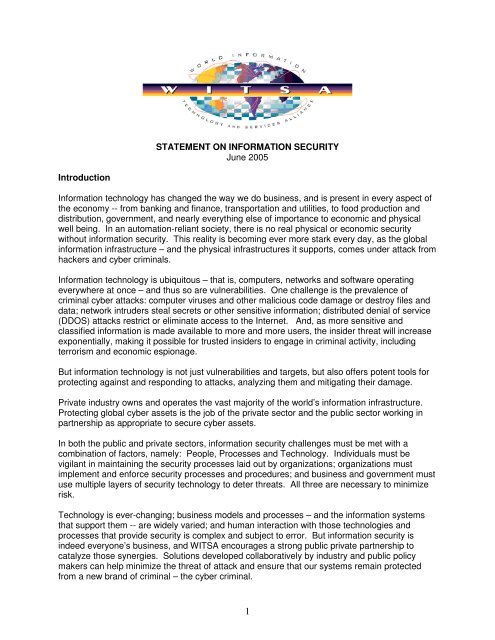
![witsa-[association member] ict excellence awards program](https://img.yumpu.com/51340170/1/190x245/witsa-association-member-ict-excellence-awards-program.jpg?quality=85)
